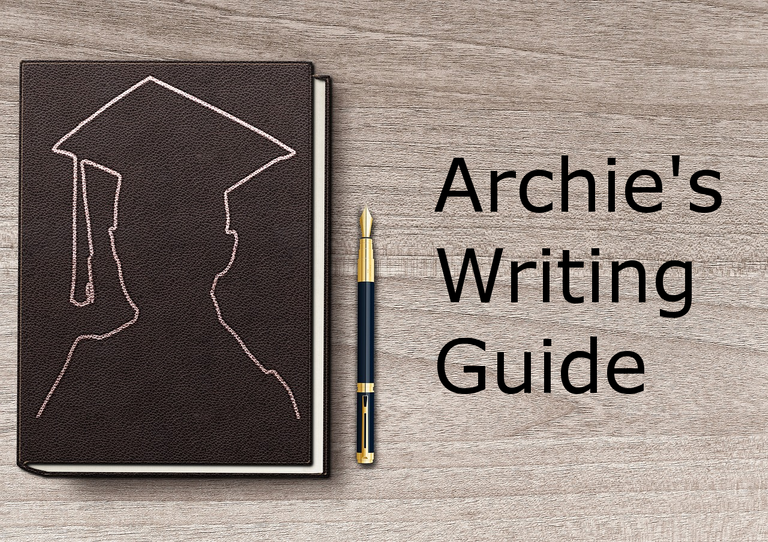Yay, the first guide post and it’s tearing down commonly given writing tips! I’m gonna get yelled at aren’t I? But before anyone starts raging in the comments, please understand that I do mostly agree with this advice. However, a lot of people misinterpret this advice. If you feel I’m wrong, then you’re free to rage down in the comments in an organized and orderly manner.

Show, don’t tell is a good piece of advice yet I think writers take this too literally. I’ve read stories where the author shows everything and it gets rather annoying reading block after block of text. This even extended to travel between locations. Unless something happens that changes the plot’s course, develop character, or just plain cool/humorous, I don’t want to read lengthy passages of nothingness.
Telling is sometimes necessary too. Readers need to know important lore info or certain scenes such as a fight between two characters to provide a quicker pace.
However, this does not give a writer an excuse to always tell in modern day. Unless it’s required for the type of story you’re writing, like a short story, many readers will get bored. This is why show, don’t tell is a popular piece of advice to give.
Personally, I think showing should be largely restricted to character actions, senses, emotions, and thoughts. Describing a couch in detail is something I don’t want to know aside from a few details. Like dog poop recently being cleaned, but still has a stain and a character sits on said stain. Or, if a story has multiple POVs a writer could use the couch to show how different characters react to it.
For example,
John studied the couch. It seemed sub-par to what he was used to as being rich allowed for top of the line seats. He even got discounts from certain producers because he was white. However, he was having money trouble and needed a new couch proto. So here he was, looking at sub par furniture.
This couch caught his because it was a rich brown and was leather, similar to the couch that was thrown out. The only problem was some kind of stain spread over the bottom cushions. Oh it didn’t matter, it was a stain, he can clean it.
Now to test how comfortable it was.
-
Jeremy had found the perfect couch for his meager budget. It was a rich brown and made out of leather! He never had a leather couch before. All of his friends are going to be envious, or crack jokes that another brownie had joined their little group of colored people.
However, there was just one problem. He’d seen his puppy crap the old couch enough times to recognize a poop stain and this one was spread over the bottom cushions. How could a dog leave such a huge stain though?
Whatever, he’ll just tell the seller there’s a big stain on it. Hopefully, there was a stain remover nearby.
In the end, combining both showing and telling is a great tool for any writer. I’ll also post a more in-depth guide a to showing and telling sentences and when to use them in the future as well.
I wonder how many people screamed when they saw this one.
Anyways, the advice, ‘avoid adverbs’ isn’t useful. I think it should be reworded to ‘use adverbs sparingly’ instead. After all, adverbs aren’t bad because they’re a writing tool. Their purpose is to modify or qualify an adjective, verb, or another adverb which can be used to great effect if done properly. So avoiding adverbs would restrict a writer’s way of communicating an idea. It would also be difficult to avoid adverbs since there are several words that can be adverbs, verbs, adjectives, etc.
For example, before. Before is a preposition, conjunction, & adverb and would be required for describing distance. So if it’s required at times, so why all the hate?
I believe it started because many novice writers used it to enhance their prose. But they failed to use it in the proper way. Adverbs were either used too often or in the wrong places annoyed readers.
So if a writer used adverbs sparingly, it would result in a straightforwardly narrative and not an uncomprehendingly mess.
Hm, I’m not sure you get it. Let me reword it and reduce the adverbs.
If a writer used adverbs sparingly, it would result in a clear narrative and not a mess.
Tension is the emotional factor that plays into conflict and suspense is uncertainty about the outcome of an event. Let’s use an example.
Two friends find themselves on opposing sides in a war. They meet each other during a battle and are shocked to see one another. They must decide to kill their former friend or not.
Now let’s break it down. The conflict is that the two friends are fighting for two opposing sides. The tension, or emotional aspect, is that they’re friends. Finally, the suspense is the outcome. Will they fight or will they not fight? If the scene is written properly and the readers care about the characters it can result in a tension and suspenseful conflict.
Further Reading
Show, don’t Tell
https://kidlit.com/2010/06/23/when-to-tell-instead-of-show/
https://novelrocket.com/2017/04/5-reasons-to-tell-instead-of-show.html/
Adverbs
https://io9.gizmodo.com/5437610/seriously-whats-so-bad-about-adverbs
https://mattmoorewrites.com/2012/10/18/the-avoid-adverbs-rule-is-very-wrong/
http://www.writersdigest.com/editor-blogs/there-are-no-rules/dont-dismiss-adverbs
Conflict and Tension
https://www.helpingwritersbecomeauthors.com/conflict-and-tension/
https://www.helpingwritersbecomeauthors.com/misused-writing-advice/ - At Number 5
http://literary-devices.com/content/suspense

Apparently you consider the concept of proofreading to be some misunderstood writing tip too.
Difficult to consider your advice as credible when the writing is so sloppy.
Hm, I thought I did proofread it. I'll have another look at it and see what I did wrong.
After rereading it, I have discovered errors. I thank you for pointing that out and I shall strive not to make the mistake in the future.
Well, let's see... words left out and words spelled wrong.
It's either sloppy writing or really bad writing. Your choice.
Thanks for pointing that out. As I have stated, I will work to fix those mistakes and make sure it doesn't happen in the future.
Congratulations @archwar! You received a personal award!
Click here to view your Board
Do not miss the last post from @steemitboard:
Vote for @Steemitboard as a witness and get one more award and increased upvotes!
Congratulations @archwar! You received a personal award!
You can view your badges on your Steem Board and compare to others on the Steem Ranking
Vote for @Steemitboard as a witness to get one more award and increased upvotes!